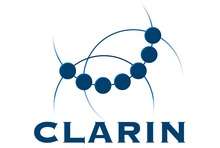CLARIN
 Common Language Resources and Technology Infrastructure | |
| Formation | 2012-02-29 [1] |
|---|---|
| Type | IGO, ERIC |
| Headquarters | Utrecht, Netherlands |
Region served | Europe |
Membership | Austria, Bulgaria, Czech Republic, Denmark, Estonia, Finland, Germany, Greece, Hungary, Italy, Latvia, Lithuania, Netherlands, Norway, Poland, Portugal, Slovenia, Sweden ; intergovernmental organization: Dutch Language Union; Observer: United Kingdom; |
Official language | English |
Executive Director | Franciska de Jong |
Main organ | general assembly, board of directors, national coordinators forum |
| Website | www.clarin.eu |
CLARIN is a European research network working in the field of archiving and processing of language-related resources in the humanities and social sciences. CLARIN is an acronym for Common Language Resources and Technology Infrastructure. CLARIN is a community of scholars of various disciplines and a network of institutions. The scholars use CLARIN as a forum for joined developments and exchange of resources. They also exchange information on standards and procedures for long time archiving of research data. The institutions of CLARIN offer services in the same field. On the European level, CLARIN is an independent body operating under European law as a European Research Infrastructure Community (ERIC). CLARIN ERIC represents the CLARIN community in the public and coordinates individual efforts in the field.
CLARIN is listed in the Registry of Research Data Repositories re3data.org.[2]
Objective
CLARIN's objective is to provide a research infrastructure for researchers of the humanities and social sciences working with language related material. The network should allow the persistent storage and access to the data in an archive, to disseminate the material and to reuse it in other research contexts. By exchanging material, effects of synergy are achieved by not duplicating work and participating at each other's development. Additionally new research questions can follow and the material can be used for quality assurance in the research process. By offering depositing services, tutorials and support for archiving, special search engines for language resources and web based analysis systems the infrastructure becomes usable for the research community.
Services offered
CLARIN offers a wide range of services to the research community, for example:
- Virtual Language Observatory,[3] a special search engine for language resources available to the academic community via CLARIN
- Depositing services,[4] where scholars can deposit their own language related materials resulting from academic research processes
- Web based analysis tools[5] (webservices), offering software from computational linguistics for the academic community.
In addition to such technical services, tutorials are prepared, standards and processes developed and implemented. Researchers receive support in the archiving process, for example by reference material, see for example.[6]
Membership
CLARIN ERIC currently has the following member countries:
- Austria
- Bulgaria
- Czech Republic
- Denmark
- Estonia
- Finland
- Germany
- Greece
- Hungary (since August 2016 [7])
- Italy
- Latvia
- Lithuania
- Netherlands
- Norway
- Poland
- Portugal
- Slovenia
- Sweden
- United Kingdom (observer)
The Dutch Language Union (DLU) is an intergovernmental organization and member of CLARIN as well.
Type of organization
The CLARIN consortium is organized as a European Research Infrastructure Consortium (ERIC) under European law, which is a special type of organization created for research infrastructures. It is hence part of the activities in the European Strategy Forum on Research Infrastructures (ESFRI) context.
Government
On the European level CLARIN is governed by the following structures:
- CLARIN General Assembly: Assembly of all members of CLARIN ERIC, represented by a delegate of the appropriate ministries. There is one delegate per country who may bring a subject matter expert.
- CLARIN Board of Directors: Assembly of the directors for coordinating the committees, serving as contact points and for the administration of the consortium. It is the highest body outside of the General Assembly. The directors are nominated by the General Assembly. The chair persons of the National Coordinators' Forum and of the Standing Committee of CLARIN Technical centers are ex officio members of the Board of Directors.
- CLARIN National Coordinators' Forum: committee of national subject matter experts with one delegate per member.
- CLARIN Standing Committee of Technical Centers (also: Centre Committee or SCCTC): Delegates of the different CLARIN centres.
- CLARIN Scientific Advisory Board: consulting body of international experts who are not part of CLARIN but nominated by the General Assembly.
- Other consulting committees as needed. At the moment there is the CLARIN Legal Issues Committee, (CLIC) and the CLARIN Standards Committee.
The seat of CLARIN ERIC is at the University of Utrecht with the office of the Executive Director. The staff of the office and all other institutions works distributed, the participants can be from all EU countries, and the staff may work from their home institutions.
Every member has a national CLARIN partner organization, often organized as national project networks. Every member supports at least one CLARIN centre, providing a repository for the humanities and social sciences scholar working with language oriented research data. Often these centres offer additional technical services and some webservices beyond the national community.
Scholars of the CLARIN community meet every year for the CLARIN Annual Meeting. For this every member may send delegates, experts from CLARIN centres. These meetings are also used for the committees to report on their progress and inform about new developments.
External links
- Official website of the European Research Infrastructure Consortium CLARIN
- Website of the European Commission on European Research Infrastructure Consortia
- List of CLARIN national consortia
- Decision of the European Commission and Statutes CLARIN ERIC
References
- ↑ Press release of the European Commission
- ↑ "CLARIN entry in re3data.org". www.re3data.org. Retrieved 20 August 2014.
- ↑ Virtual Language Observatory
- ↑ Depositing Services
- ↑ Web based analysis tools
- ↑ CLARIN User handbook by CLARIN-D
- ↑ https://www.clarin.eu/news/hungary-joins-clarin-eric